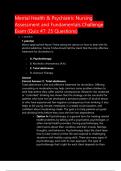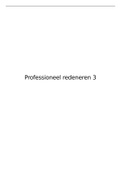Exam (elaborations)
TEST BANK Mental Health & Psychiatric Nursing Assessment and Fundamentals Challenge Exam (Quiz #7: 25 Questions)
- Course
- Institution
Description: Prepare for success in your mental health and psychiatric nursing exams with our comprehensive ATI NCLEX Challenge Exam (Quiz #1: 50 Questions) package, complete with detailed answers and explanations. This invaluable resource is tailored to help nursing students and professionals ali...
[Show more]




